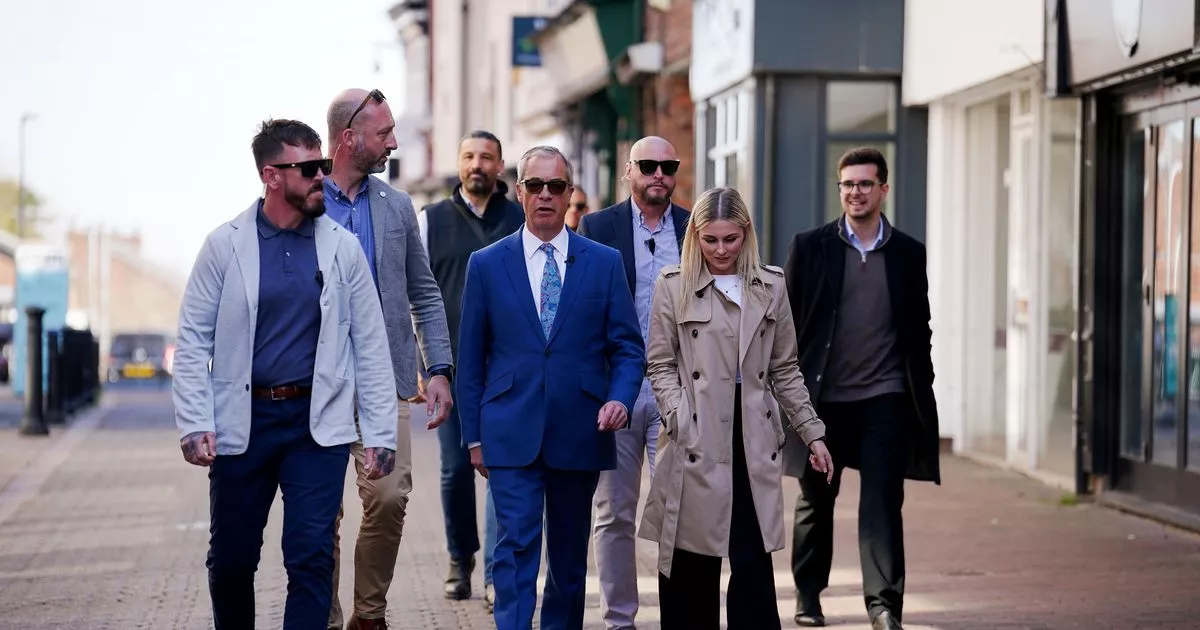Reform UK is already preparing for the next elections in Greater Manchester, 12 months before they are scheduled to take place. Politics writer Jo Timan looks at what they might achieve and how it could impact Greater Manchester politics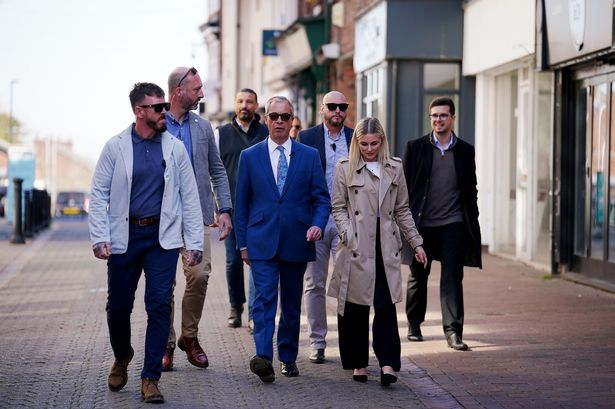 Nigel Farage’s Reform UK is on the rise
Nigel Farage’s Reform UK is on the rise
As voters across England head to the polls on Thursday (May 1), all eyes are one political party that didn’t even exist a few years ago.
Reform UK’s popularity has been rising ever since the general election last year, with some opinion polls now putting them ahead of Labour. Last week, a new poll predicted that Nigel Farage’s party would win a general election if the vote was called imminently.
The More in Common poll predicts that Reform would win just over half the seats in Greater Manchester, including every constituency in Bolton, Bury, Oldham and Wigan, as well as some in Rochdale and Tameside such as Deputy Prime Minister Angela Rayner’s seat.
Some experts are sceptical about these predictions, but there’s no doubt that the party is already posing a threat to Labour locally.
Earlier this month, Reform claimed its first council seat in Greater Manchester, winning a by-election in Tameside’s Longdendale ward.
Speaking at the election count in Hattersley, newly-elected councillor Allan Hopwood said he was ‘overwhelmed’ but ‘not surprised’.
“It’s clear to me there were a lot of fed up people,” he said, before predicting, “there are more Allan Hopwoods waiting to come along.”
Who are Reform UK?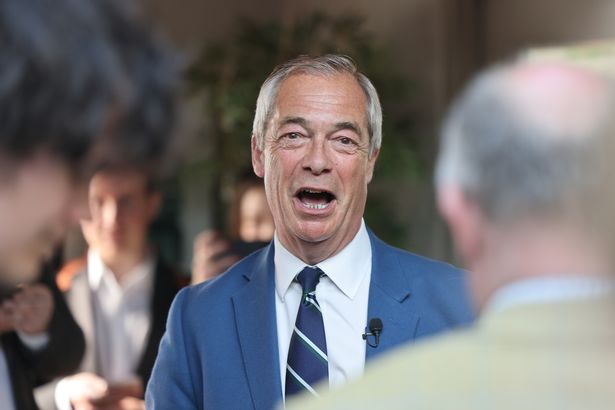 Findings from a poll last week suggest that if an election were to be held now, Reform UK would win(Image: Iain Buist/Newcastle Chronicle)
Findings from a poll last week suggest that if an election were to be held now, Reform UK would win(Image: Iain Buist/Newcastle Chronicle)
Formed in 2018 as the Brexit Party and later renamed Reform, it’s is often seen as the successor to UKIP which Mr Farage also led.
But while both parties are on the right of politics with a shared goal of cutting immigration, Reform’s ambitions appear to be broader.
Earlier this year, Mr Farage called for the ‘reindustrialisation’ of Britain before backing British Steel being brought into public ownership.
Parking his tanks on Labour’s lawn when it comes to welfare, Mr Farage has also spoken out against the two-child cap on benefits.
Reform already has more of a presence in Parliament than UKIP ever did, winning five seats at the general election last July.
The party is now hoping to win another seat at the Runcorn and Helsby by-election which is taking place on Thursday (May 1).
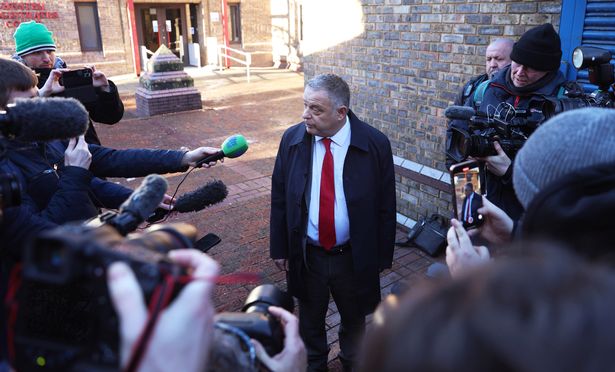 Mike Amesbury was suspended from Labour after a video emerged of him punching a constituent(Image: Getty Images)
Mike Amesbury was suspended from Labour after a video emerged of him punching a constituent(Image: Getty Images)
The vote was triggered when Wythenshawe-born MP Mike Amesbury resigned after spending three nights in prison for punching a constituent in the street last October before his 10-week prison term was reduced to a suspended sentence following an appeal.
And while 15 candidates are standing for the Cheshire seat, Labour reckon it’s a two-horse race between themselves and Reform.
Meanwhile, local elections across the country present an opportunity for Reform to pick up council seats, including from the Tories.
There are no local elections in Greater Manchester this year – but that hasn’t stopped the party getting organised in the region.
Dan Barker, who stood for Reform in the race for Andy Burnham’s job as mayor last year, is now the party’s ‘county organiser’.
He claims that Reform now has 10,000 members across Greater Manchester with local branches set up in almost every constituency.
‘They believe this country is in a bad state’ Dan Barker stood for reform at the mayoral election last year(Image: Reform UK)
Dan Barker stood for reform at the mayoral election last year(Image: Reform UK)
Many of these members voted for Reform at the last general election, helping them come second overall across the city-region.
But according to Dan, their political backgrounds vary from ex-Tory and UKIP voters to Labour voters and people who don’t vote at all.
“The unifying thing with all of them,” he says, “is that they believe this country is in a bad state with public services and high taxation.”
Although there are no elections in Greater Manchester until next year, party activists are already delivering leaflets in places like Leigh and Atherton, while some are said to be holding advice surgeries in Wigan and helping residents with things like GP appointments.
While Dan says that there are no formal advice surgeries being held, he says that prospective candidates are picking up ‘casework’.
The ex-Tory who dramatically defected to Reform last year, says the party’s infrastructure has been put in place impressively fast.
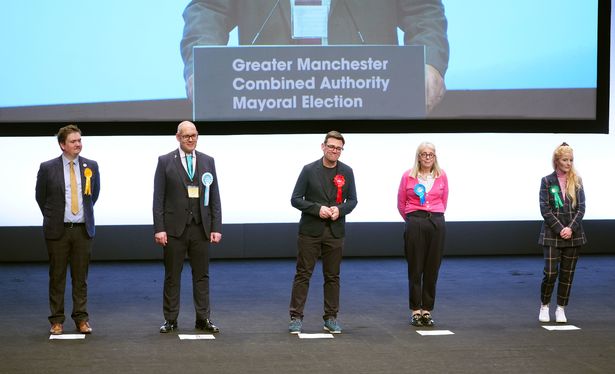 Dan defected from the Tories to stand for Reform(Image: Peter Byrne/PA Wire)
Dan defected from the Tories to stand for Reform(Image: Peter Byrne/PA Wire)
And while he is confident Reform will contest every seat in Greater Manchester at the next general election, his targets are clear.
“Oldham, Wigan, Makerfield, Leigh and Atherton,” he says, “anywhere on the outskirts I think are prime to come over [to Reform].”
“Those in the centre where you’ve got more immigrant and ethnic communities, I think they don’t understand what Reform is about.
“I think there’s been a lot of lies in the media that we’re a racist party, or anti-immigration,” he adds.
“If you’re a second generation immigrant, for example, you’re going to be impacted by the population explosion as well.”
“It’s the same message for them as it’s for everywhere else.”
‘They are completely right to be angry’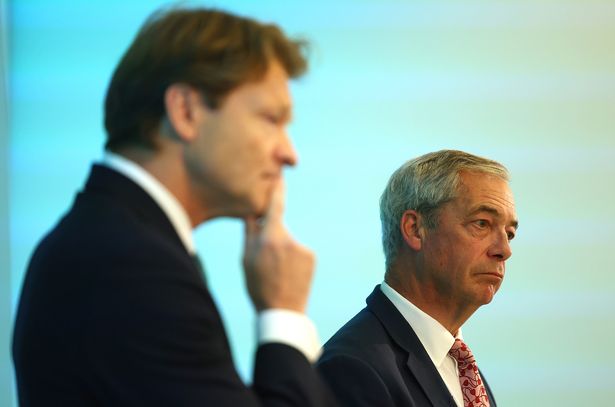 Nigel Farage took over from Richard Tice (left) as party leader during the election campaign(Image: Getty Images)
Nigel Farage took over from Richard Tice (left) as party leader during the election campaign(Image: Getty Images)
Reform’s surge in the opinion polls during the general election campaign last year is widely credited to the return of Mr Farage.
So popular was the politician that Reform gained thousands of votes in areas where their local candidates were nowhere to be seen.
Some candidates were so invisible that the party was later forced to deny rumours that some of those standing didn’t even exist.
Reform also admitted to failings in its vetting process after stories of its candidates sharing racist social media posts emerged.
Despite claiming it has improved, Reform is still facing criticism for some of the candidates it has fielded for the elections next week.
While Dan believes the new vetting system that the party now has in place is ‘robust’, he admits that no such system is perfect.
“Parties will inevitably have some people who get through vetting because they’ve lied and it’s come out later,” he says, insisting that Reform has a ‘track record’ of taking action against those who are ‘blatantly racist’, including people previously part of far-right groups.
 Reform won its first council seat in Greater Manchester earlier this month(Image: LDRS)
Reform won its first council seat in Greater Manchester earlier this month(Image: LDRS)
When it comes to the local elections next year, Dan doesn’t believe Reform will take control of any council in Greater Manchester.
However, he reckons Reform could become the main opposition at Tameside, Salford, Oldham, Wigan, Bolton and Bury councils.
This may all seem a bit far fetched for a party that only just won its first council seat in Greater Manchester a few weeks ago.
But even Labour sources admit that Reform are likely to pick up more seats in the region – the question is how many and where.
According to one Labour MP in Greater Manchester, the party’s rising popularity is plain to see, and the reason for it is obvious.
“You can tell within five minutes of a conversation based on the emotional tone,” they said.
“If someone’s angry, they’re more likely to be thinking about voting Reform.
“Most of those who are angry are completely right to be angry.
“Democracies are failing to deliver tangible change. Working class voters are telling them.”
